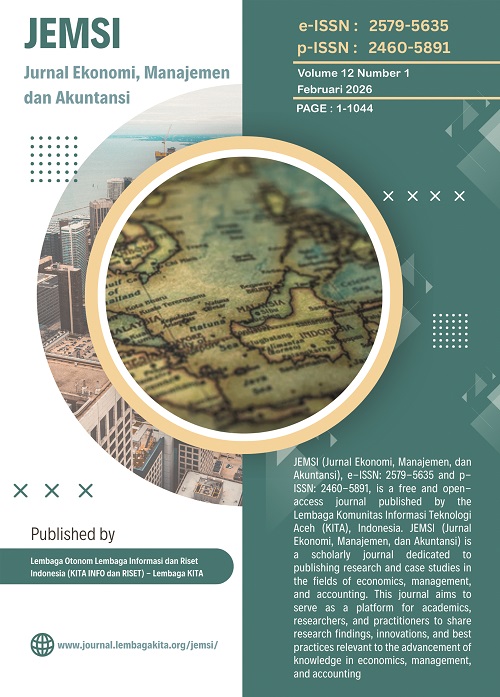Published: 2023-10-01
The Influence Of Motivation, Organizational Communication And Job Satisfaction On The Performance Of Employees In Executive Travel Services Companies
DOI: 10.35870/jemsi.v9i5.1591
Rulyenzi Rasyid, Dian Ariani, H. M. Anwar, Muhammad Syafri, Muhammad Irvan
- Rulyenzi Rasyid: Institut Teknologi Indonesia , Indonesia .
- Dian Ariani: Universitas Teuku Umar , Indonesia .
- H. M. Anwar: Sekolah Tinggi Teknologi Informasi NIIT (I-Tech) , Indonesia
- Muhammad Syafri: State University of Makassar , Indonesia .
- Muhammad Irvan: Sekolah Tinggi Ilmu ekonomi Mujahidin , Indonesia
Article Metrics
- Views 194
- Downloads 534
- Scopus Citations
- Google Scholar
- Crossref Citations
- Semantic Scholar
- DataCite Metrics
-
If the link doesn't work, copy the DOI or article title for manual search (API Maintenance).
Abstract
This study was carried out at one of Jakarta's transportation businesses. In this study, the dependent variable is employee performance, while the independent factors are organizational communication and motivation, the intervening variables are work satisfaction, and the intervening variables are intervening variables. Through the use of intervening factors, this study tries to ascertain the interaction between the independent variables and the dependent variable both concurrently and partially directly or indirectly. Using a basic random sampling procedure, 100 respondents made up the sample size. The route analysis approach, which is based on prior correlation and regression analysis, is used to evaluate hypotheses. The outcomes of a hypothesis test conducted on the model-1 structure demonstrate that organizational communication, motivation, and work satisfaction all concurrently have a beneficial impact on employee performance. The outcomes of a hypothesis test conducted on the model-2 structure demonstrate that organizational communication and motivational factors both positively impact work satisfaction.
Keywords
No keywords available.
Article Metadata
Peer Review Process
This article has undergone a double-blind peer review process to ensure quality and impartiality.
Indexing Information
Discover where this journal is indexed at our indexing page to understand its reach and credibility.
Open Science Badges
This journal supports transparency in research and encourages authors to meet criteria for Open Science Badges by sharing data, materials, or preregistered studies.
How to Cite
Article Information
This article has been peer-reviewed and published in the JEMSI (Jurnal Ekonomi, Manajemen, dan Akuntansi). The content is available under the terms of the Creative Commons Attribution 4.0 International License.
-
Issue: Vol. 12 No. 1 (2026)
-
Section: Articles
-
Published: %750 %e, %2023
-
License: CC BY 4.0
-
Copyright: © 2023 Authors
-
DOI: 10.35870/jemsi.v9i5.1591
AI Research Hub
This article is indexed and available through various AI-powered research tools and citation platforms. Our AI Research Hub ensures that scholarly work is discoverable, accessible, and easily integrated into the global research ecosystem. By leveraging artificial intelligence for indexing, recommendation, and citation analysis, we enhance the visibility and impact of published research.




No author biographies available.
-
-
-
-
-
Cartono, C., & Maulana, A. (2019). Communication Climate, Organizational Climate and Organizational Communication Climate. Orasi: Journal of Da'wah and Communication, 10(2). https://doi.org/10.24235/orasi.v10i2.5420
-
-
-
-
Authors who publish with this journal agree to the following terms:
1. Copyright Retention and Open Access License
Authors retain copyright of their work and grant the journal non-exclusive right of first publication under the Creative Commons Attribution 4.0 International License (CC BY 4.0).
This license allows unrestricted use, distribution, and reproduction in any medium, provided the original work is properly cited.
2. Rights Granted Under CC BY 4.0
Under this license, readers are free to:
- Share — copy and redistribute the material in any medium or format
- Adapt — remix, transform, and build upon the material for any purpose, including commercial use
- No additional restrictions — the licensor cannot revoke these freedoms as long as license terms are followed
3. Attribution Requirements
All uses must include:
- Proper citation of the original work
- Link to the Creative Commons license
- Indication if changes were made to the original work
- No suggestion that the licensor endorses the user or their use
4. Additional Distribution Rights
Authors may:
- Deposit the published version in institutional repositories
- Share through academic social networks
- Include in books, monographs, or other publications
- Post on personal or institutional websites
Requirement: All additional distributions must maintain the CC BY 4.0 license and proper attribution.
5. Self-Archiving and Pre-Print Sharing
Authors are encouraged to:
- Share pre-prints and post-prints online
- Deposit in subject-specific repositories (e.g., arXiv, bioRxiv)
- Engage in scholarly communication throughout the publication process
6. Open Access Commitment
This journal provides immediate open access to all content, supporting the global exchange of knowledge without financial, legal, or technical barriers.
